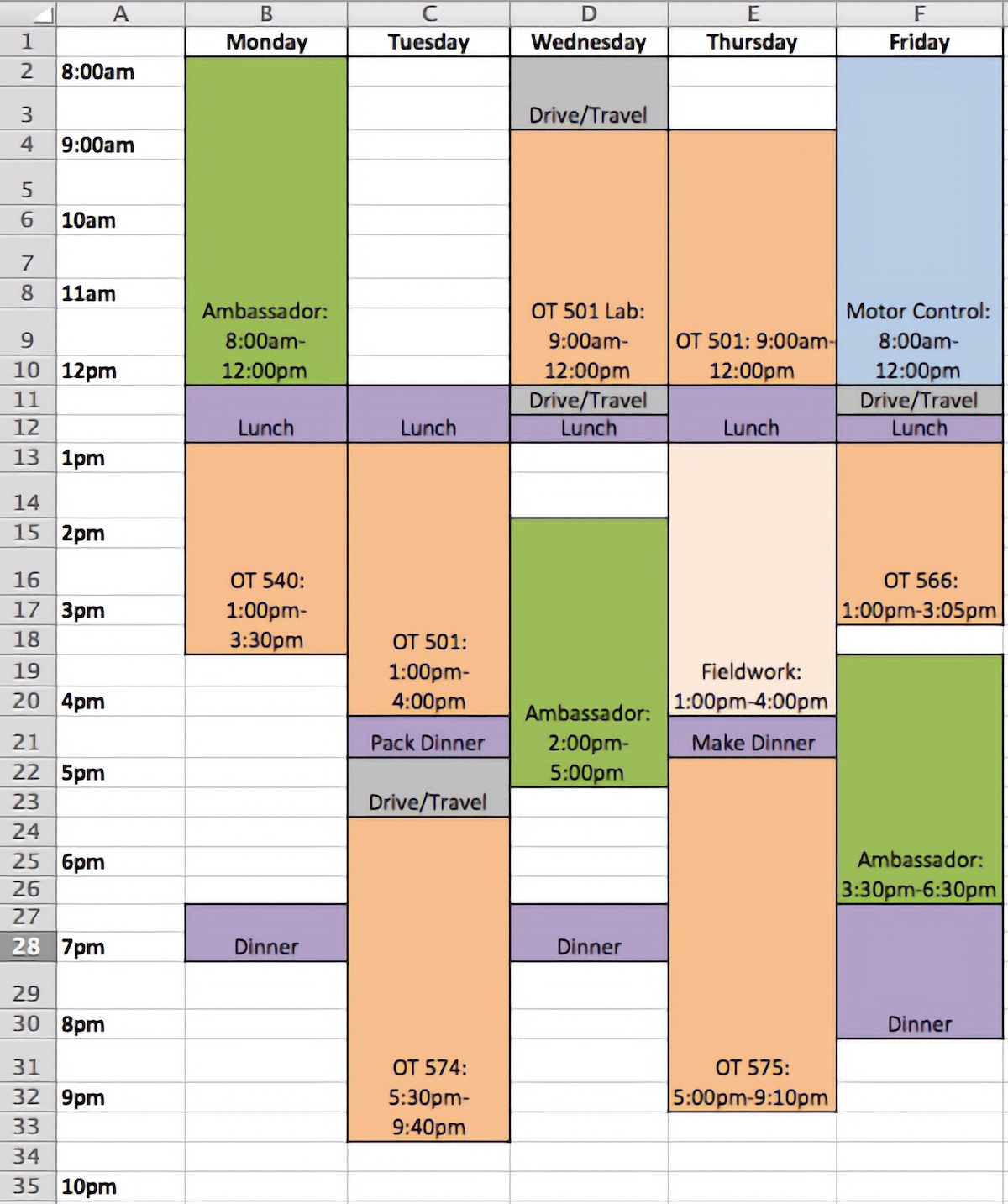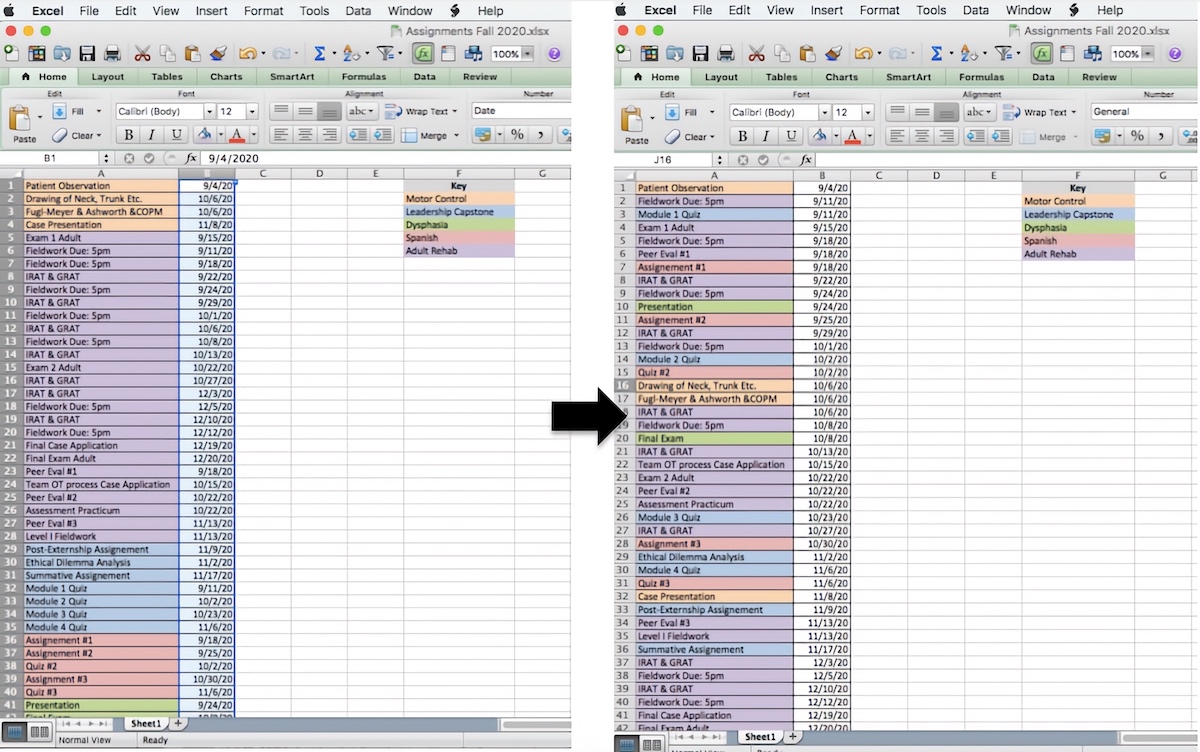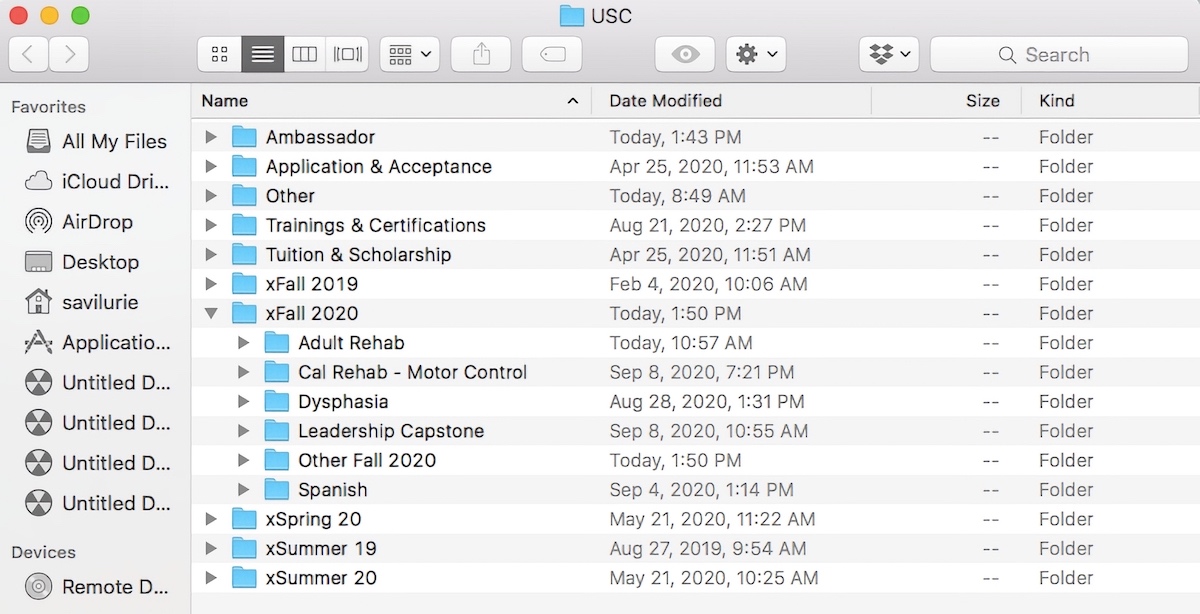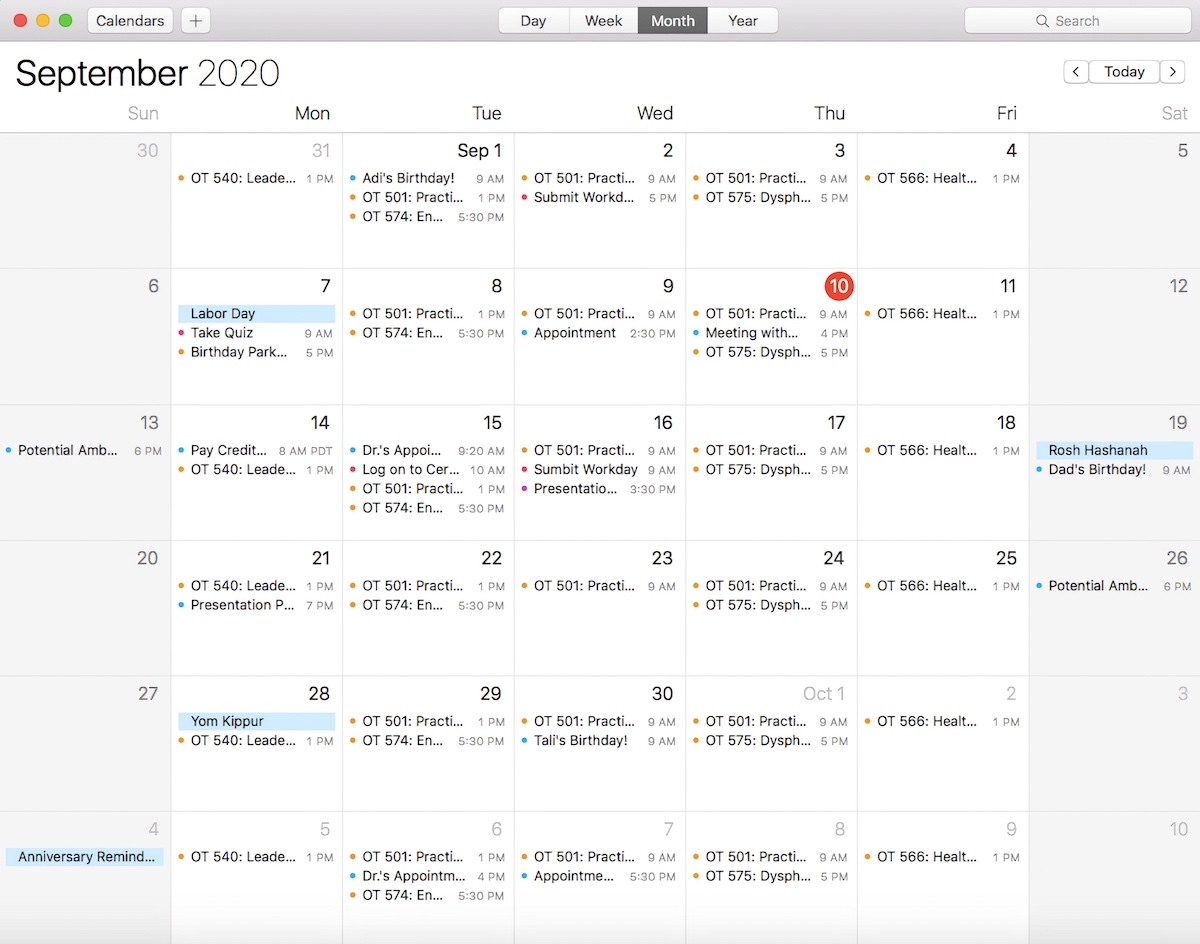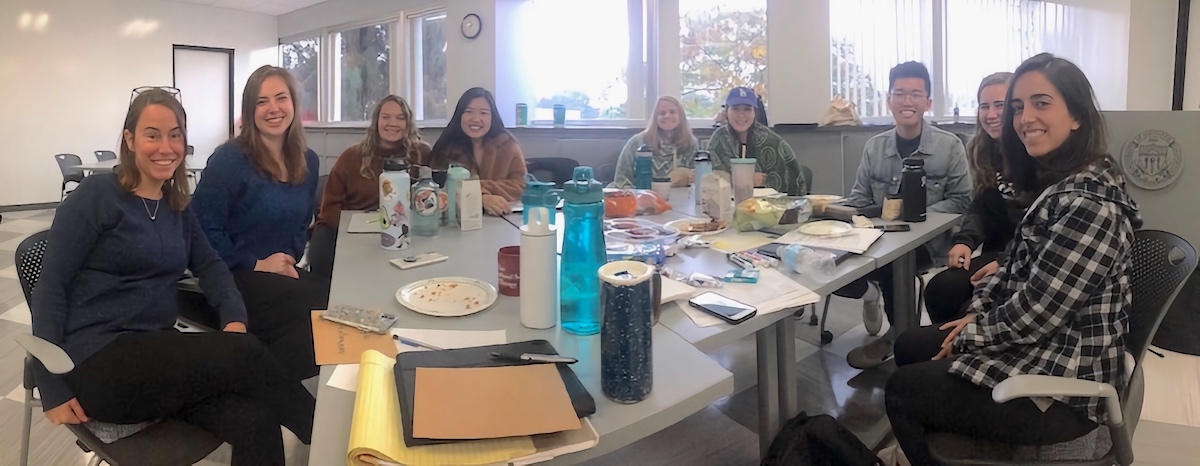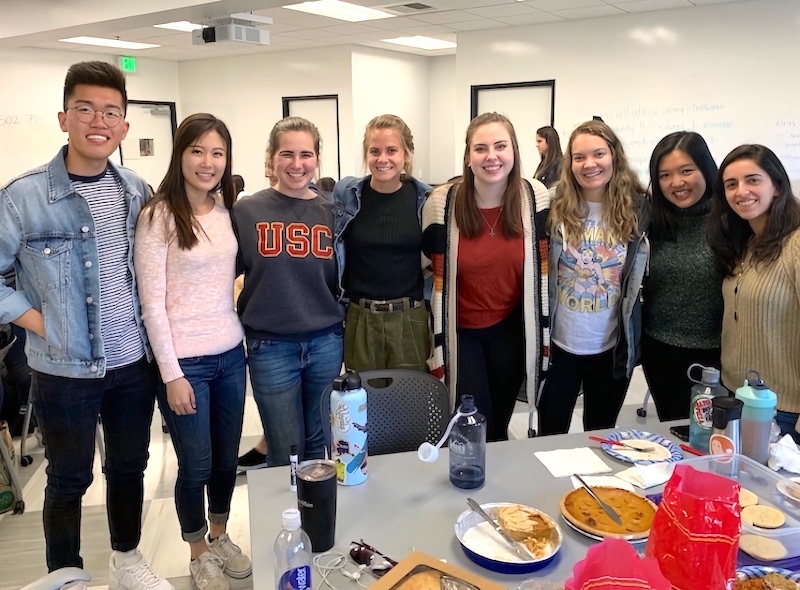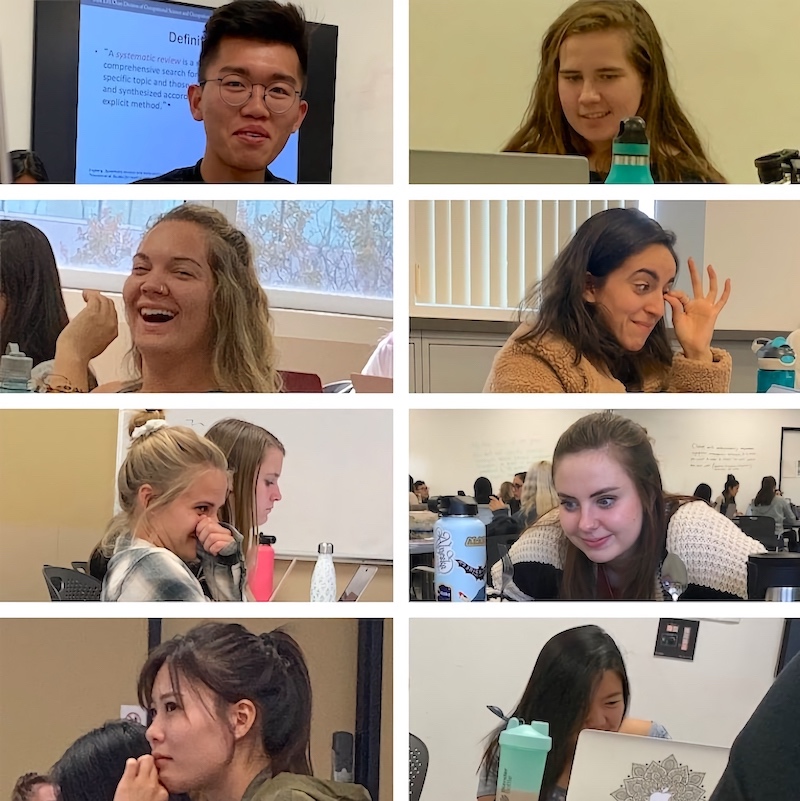Student Blog
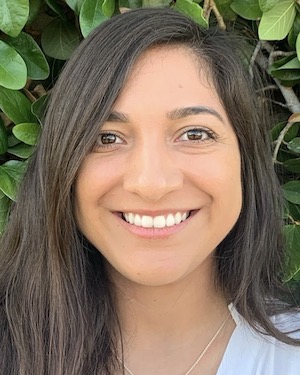
My First Level 1 Fieldwork in Permanent Supportive Housing ⟩
September 17, 2020, by Liz
The mental health immersion has been by far one of my favorites! Before grad school I had zero experience in this type of setting and I didn’t know what OT in mental health looked like. So, I was excited to learn all about it! A couple of weeks into my first fall semester, I learned that I would be completing my first level 1 fieldwork experience at a permanent supportive housing facility. The residents at this facility were all individuals who were transitioning from homelessness to permanent housing. This is one of the settings that you’ll get a chance to learn about in the immersion.
To my surprise there wasn’t an OT at my site, but I learned SO much. This was because there’s already a smaller representation of occupational therapists working in mental health settings. Fortunately, there were a couple of case managers and an event coordinator present who collaborated with each other to best support the residents. At first it made me really nervous that there wasn’t an OT at my site. I already didn’t know what OT looked like in a mental health context and the fact that it was my first fieldwork experience felt intimidating. However, I will say it was comforting to have one of my colleagues at the same site with me!
The site was relatively new, and most of the residents didn’t really know each other. However, a few of them did from seeing each other at some of the same shelters prior to obtaining housing. On our first day, we knocked on every single resident’s door to introduce ourselves. Even after we introduced ourselves, at first it was difficult for my colleague and I to interact with a lot of the residents. They preferred to stay in their rooms and only came down to the main lobby for coffee or snacks. So, my colleague and I asked ourselves: what would our goal be while we were there? We broke down some of what we had learned in class so far and decided that we wanted to establish a sense of community among the residents. We hoped to promote social engagement and wanted the site to feel like home. And of course we also wanted to encourage the residents to engage in meaningful occupations!
We discussed our ideas with the case managers and event coordinator to make sure it was okay to move forward and they were on board! After receiving the green light, we designed a monthly calendar full of different groups/activities the residents could attend which included gardening, bingo, cooking groups, exercise groups, and computer classes. We also got to use some of the money available in the budget to order some yoga mats, light weights, coloring supplies, and raffle gift cards for bingo.
Every week we would make a new flyer to promote the groups we would be hosting for the day, knock on people’s doors, and invite them to join us. What started with one person attending our first couple of groups turned into more than 10 people joining us! I had the chance to work with one resident who wanted to learn how to use a computer to type up his own songs. He loved music, and I showed him how to use Microsoft Word to type them up. I taught him how to use the internet to search up websites that help you practice typing on the keyboard. I also helped another resident type up a resume. She wanted to go back to work and wanted to get a resume ready. Being able to support these residents engage in activities they found meaningful was amazing.
Over time, some residents felt more comfortable coming down to the lobby even during hours when we weren’t hosting any group sessions. It was an amazing experience also serving as social support for them. Several residents didn’t have any family or friends, while some had simply lost touch with them. On some days we would just sit in the lobby, listen to music and just talk. We were able to order a speaker for bingo that had an aux, so I was able to take some song requests. Billie Jean was a HIT! But, hearing their stories was the best part.
My professional boundaries were also tested while I was at this site. I am a very petite woman, and one of the residents who was also around my size wanted to give me a USC sweater she said no longer fit her. We had talked about this in class and how we may have to make ethical decisions when at fieldwork and in practice. But, I didn’t know making those decisions would come so soon! This woman whom I had established wonderful rapport with wanted to gift me a sweater. How could I decline? I definitely didn’t want her to think it was because I didn’t like it or because it wasn’t brand new. Would this affect our therapeutic relationship? I knew the right thing to do was to decline the gift. So, I explained that I was not allowed to accept any gifts, but that I would take a picture with it and keep that instead. I could tell she was disappointed at first, but she was happy to see that I took a picture with it! This was definitely a difficult decision to make, but an important part of my learning experience.
Overall, I had a great time and learned a lot! As I am writing this blog post I can’t help but think about all of the wonderful residents I met at this site. I am hoping they are all doing well and full of health! If you are a student in the program who hasn’t taken the mental health immersion, I am certain you’ll have a wonderful experience too. And, if you’re a future Trojan you also have some exciting experiences to look forward to!
⋯
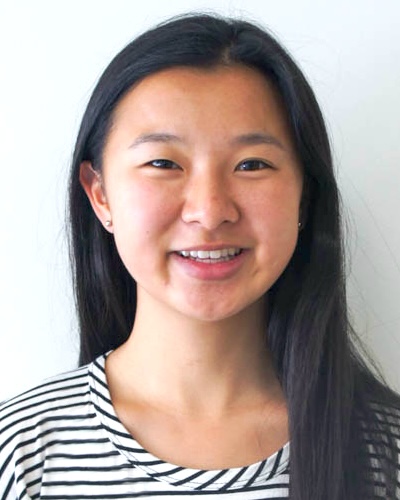
Introducing OT ⟩
September 16, 2020, by Bethany
Between our summer session ending and the start of fall, we had a one week break. And I tried to make the most of the time. I engaged in some of my favorite activities that had been pushed off during finals week, including different musical occupations. One of the most entertaining is making parodies of songs and rewriting lyrics.
I found myself reflecting on my school experiences as an OT. Ever since freshman year, I’ve had to have a definition of my major at hand. That basic introduction question of “What are you studying?” probably brought more explanation than that poor engineering student was expecting. But I thought it would be fun to put it all in song form. I hope you find this parody of Nick Jonas’ “Introducing Me” both informative and amusing. So whether you’re here for the laughs or you’ve stumbled onto this page by accident and want to learn more about OT, here it is, for your perusing.
⋯
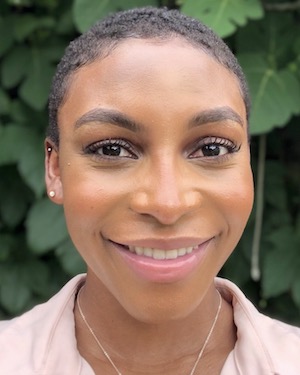
So, You Have Submitted Your Application ⟩
September 11, 2020, by Lamoni
It is that time of the year when potential students are pressing that “submit” button! If that is you, congratulations! Completing applications is undoubtedly the most stressful part of applying to schools. You have completed all of your pre-requisites, spent several hours observing, gathered recommendation letters, wrote an impressive personal statement, sat 4 long hours to take the GRE, and maybe did a couple of interviews as well — CONGRATULATIONS! Please give yourself a pat on the back. Those are a lot of steps; You have already accomplished a lot.
But, nobody talks about the waiting game. This is also a very stressful time. I remember the big sigh of relief when I turned in all 9 of my OT school applications (Thank goodness for OTCAS am I right?). However, the feeling of relief was fleeting. Getting into OT school is a very competitive process and it only gets more competitive each year. The daunting question of “What if I don’t get in?” crossed my mind soon after submission.
I also had feelings of guilt because the number of things on my plate had significantly decreased. When applying, I was working, taking classes, observing, and studying. After, all I had to do was work. I was no longer extremely busy, and I felt weird about it. Was I doing enough? Should I be doing more?
I was also on OT blogs and OT reddit posts non-stop. Once people started posting their acceptances and rejections, the anxiety was unbearable. I started having dreams about checking my email!
It should not have been that stressful. That should have been my time to take a step back and breathe. If you are going through the same challenges that I went through, here is what you should do:
Create a Plan
Honestly, rejections happen. Sometimes it takes more than one try to do anything and that concept applies to getting into OT school. But it is not the end of the world. So, let’s not think of it that way. Instead, have a just-in-case plan ready. That way, if you are not accepted this time around, you will have action steps in your back pocket.During the wait, get the contact information for the directors of admissions at each of the schools you applied to. Most programs will allow you to reach out and ask about ways to strengthen your application. This way, you can have concrete suggestions on what to do instead of wondering where to start. For USC, here is the admissions team contact information.
Because we are all our biggest critic, you probably already have areas of your application that you would like to improve. For example, do you feel like you could have done better on the algebra section of the GRE? Do some practice algebra questions from time to time. Now that you have been through the process once, you have an idea of what you should focus on.
Stay (kind-of) Busy
Now that you have gotten into the routine of preparing your applications, it can be hard to break it. You don’t have to! Not all the way, at least. There’s no need to take more classes or revise your personal statement—that’s done. However, you can continue to observe and volunteer. It never hurts to increase your understanding of OT. See what the OTs in your area are doing in a variety of settings. Are most of your observation hours in pediatrics? Try mental health. Combine the two and try pediatric mental health. Did you mainly volunteer at camps? Try volunteering at a nursing home this time. This way, you are not only learning more about the profession, you are building your network. And continue to document these hours because . . . why not. Again, it doesn’t hurt.
Put Your Phone Down and Close Some of those Tabs
Why are you frantically checking your emails? It’s still September. They aren’t even sending out acceptance letters yet. Oh, and close all 6 of those forum tabs. The two YouTube videos named “how to get into OT school” is enough.
You spent more than enough time on your phone and computer during the application process. You have already seen and noted what’s on these forums and in these videos. Take a bit of a break.
Waiting is tough. Feeling like you are in lingo is challenging. But you have already done what needs to be done. Be patient with yourself and patient with the process. Add some time to your sigh of relief.
⋯

Tips to Stay Organized ⟩
September 10, 2020, by Savi
During my time in graduate school, I found that success is closely tied to organizational skills. Towards the beginning of each semester, I typically become overwhelmed by my new schedule and all of the combined assignments. I, therefore, have discovered a few simple ways to help ease my concern and make it ALL seem a little more manageable. Here is a list of a few tips you may find helpful to assist you with staying organized throughout the semester.
1. Weekly Schedule
Develop a weekly schedule PDF, Excel, or Word document that you can always refer to when you need to schedule a meeting, a study session with friends, a doctor’s appointment, or time to engage in a meaningful and rejuvenating occupation such as exercising. This weekly schedule can be color-coded and can include everything that you have committed your time to on a continuous weekly basis. This will allow you to view your weekly class, volunteer, fieldwork, and work schedule in one location, making it easy to see what time you have available in order to schedule events or utilize and assign your free time to activities and assignments. I also add in blocks for driving and eating to better understand what time I have completely free and what time I am filling with other necessary occupations. Here is my weekly calendar example:
2. Excel Assignment List
At the start of each semester I go through every single syllabus and note the assignment with the due date on an excel document. I color-code each class and then use the sort tool to organize the assignments by the due date. This way I can scroll through at the end of each week to see what I need to do over the weekend, plan what I can complete during my free time allotted in my weekly schedule, and check to make sure I have completed the all of the assignments before I go to bed each night. This is a quick and easy way to have all the assignments and exam due dates listed in one location! You can also delete the row or change the color of the assignment once it is completed to feel a sense of relief and instant satisfaction. Here is how I created mine:
Savi’s Assignments in an Excel List. To get from the first color-coded list to the second list organized by date due follow these instructions: 1. Highlight the “B” column as demonstrated in the picture on the left. 2. Select “Data” from the drop-down menu at the top of the screen. 3. Select “Sort” and choose the “expand the selection option”. 4. Select “Column B” option from the column drop-down and select the “January, February, March, April . . . December” option from the order dropdown. This option may be listed under “custom list” if you haven’t recently selected it. 5. Select the “ok” button at the bottom of the pop-up box and the excel sheet will sort your data!
3. Digital USC Folder
I created a folder for all things USC on my desktop. Inside this folder, I have created subfolders to save and organize my documents into. For example, I have folders for each semester. Once you open my semester folder you will find a folder listed for each class I am taking. This makes it extremely easy to find my notes, study guides, online textbooks, or anything else I need for each particular class.
4. Sticky Notes
I utilize the sticky note tool on my desktop to write down small to-do lists each day, reminders, and zoom links for class that aren’t linked through blackboard to make them easily accessible. If you do not have the sticky note tool on your desktop you can do this by hand in a planner, on your phone in a notes section, or in a word document that you can continuously update.
5. Shared Calendar
I have developed a monthly calendar that is linked to my computer and to my phone. That way if I add anything on one device it will automatically link to the other. This is helpful if I am out of the house and have to organize a meeting, event, or group project. You can do this on Outlook, Google Calendar, iCal, etc. I add my classes, any breaks or holidays to that calendar, and any appointments or future reminders in this calendar.
I hope this list has provided you with at least one technique that can help you stay organized this semester. Be sure to tailor these items to fit your particular needs!
⋯
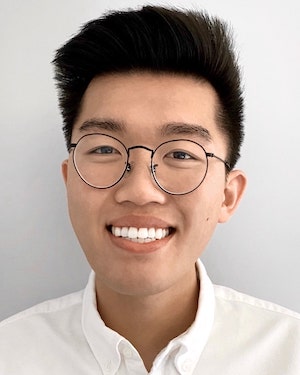
My Mental Health Immersion Experience ⟩
September 7, 2020, by Calvin
I actually started off in the Mental Health Practice Immersion but, to be honest, I came into it with little to no interest in mental health. I just wanted to get it over with so that I could focus on the pediatric and adult rehabilitation immersions since my previous volunteer experiences were more related to those settings. However, throughout my time in the immersion, my perception of what occupational therapy’s role in mental health was had changed, and I realized that it’s just as important as other OT practice areas.
On the first day of class, I felt really nervous about going into this immersion because it was my first one ever. On top of that, I had no prior experience being in the mental health field, so my knowledge and insight were extremely limited. Nerves had really taken over during the first week, but my course instructors, Dr. Celso Delgado Jr. and Dr. Tessa Milman, were instrumental in reassuring and validating the entire cohort of our feelings. They said that the purpose of this course was to help introduce us to various perspectives so that we could understand the impact of mental health on occupational engagement, as well as the influence of occupation on recovery experiences. They also emphasized that it was okay to be feeling uncertain and sensitive to the experiences ahead, so I went in with an open heart and an open mind.
The mental health immersion incorporates a related Level I Fieldwork experience, in-service training, discussions with experts by experience, team debriefs and so many more opportunities. For my Level I Fieldwork, I was placed at a community mental health site and collaborated with mental health professionals, as well as peer specialists with lived experience. Now, this may sound surprising, but there was actually no occupational therapist at my site. According to the 2015 AOTA Salary & Workforce Survey, only 2.4% of respondents worked in the mental health practice setting. I was definitely shocked by this statistic, but it pushed me to really try and inform my site of the distinct value of OT. However, even with that ambition, I still yearned for guidance from an OT and, towards the beginning, I had a difficult time understanding what occupational therapy’s role was in mental health.
I had this internal conflict where I felt like I had to spread my OT knowledge and make all this positive change. However, I realized that Level I Fieldwork experiences are meant more to be spaces for students to learn, observe, and gain exposure to the area of practice. I also had this perception that OT’s role in mental health was restricted because it seemed similar to what social workers and case managers do. However, I discovered that this isn’t true and that occupational therapy actually plays such an extensive role in community mental health. Although there is collaboration with professionals from other disciplines, OTs have the scope and capacity to address occupational needs, promote functioning in the community, analyze performance skills, and provide unique assessments and interventions. Not having an occupational therapist to guide me through my first fieldwork experience was challenging, but I was grateful for the opportunity to connect curriculum material with my immersive experience. I was also thankful to have had a very involved interdisciplinary team by my side to advocate for the OT profession and they always tried their best to provide me with as many resources as possible!
Finally, I want to talk about my experience with my Cohort B lab team! Within these groups, we did a lot of team-based learning, discussed the course material, interacted with experts by experience, and debriefed about our fieldwork experiences. These people really made my experience in the mental health immersion and I honestly would not have gotten through this without them!
Team CarrOTs! | Pictured from left to right: Dr. Tessa Milman, Tess Mayer, Liz Broske, Bethany Hom, Morgan Smith, Helen Han, Sam Randolph, Adi Nisimov | Picture credits to our Expert by Experience 😊!
My favorite part about this course was the team debriefs, where we would each share about how our different Level I Fieldwork experiences were going. This opportunity opened up a safe space for us to learn about different mental health sites, share our challenges, provide advice and feedback, and just act as each other’s emotional support systems. An expert by experience also participated by sharing their thoughts and perspectives on how to approach certain situations at our respective sites. We were also incredibly grateful to have Dr. Tessa Milman as our team’s faculty supervisor and mentor. They each imparted such extraordinary mental health knowledge and expertise while also providing us with unwavering support throughout it all. These team-based discussions opened my eyes to the various potentials of mental health and how occupational therapy plays a special role in holistically addressing the needs and barriers of individuals experiencing mental health conditions.
This is us after we devoured the food from our Cohort B lunch potluck! Then we immediately went into a food coma haha!
In the beginning, I was nervous to start the mental health immersion because I had no prior experience or exposure. However, through this opportunity, I was able to challenge my implicit biases and build supportive relationships within my team and my fieldwork site. This empowered me to see the bigger picture and to develop a deeper understanding of the connection between occupational therapy and mental health. Regardless of what setting I go into, I know that I will be using my foundation of mental health knowledge in every endeavor I pursue!
Ending this post with appreciation collage for my team! Don’t worry, these pictures were taken during class breaks~
⋯








